
Educational Resources
Blogs & Articles
The Ultimate Guide to Articles & Blogs focused on Active Inference AI and Spatial Web Technologies
Spatial Web AI Blog
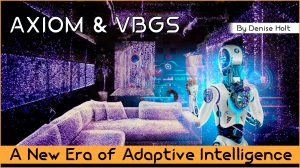
AXIOM and VBGS: A New Era of Adaptive Intelligence
AI is entering a new paradigm, and the rules are changing. AXIOM + VBGS: Seeing and Thinking Together – When combined, AXIOM and VBGS form a complete Active Inference loop: VBGS provides

VERSES AI Research Reveals Real-World Use Cases for Active Inference AI
New Episode – Spatial Web AI Podcast
Guests:Dr. Mahault Albarracin, PhD, Head of Research at VERSES AI, and Dr. David Bray, PhD, expert in global policy and governance, to explore something
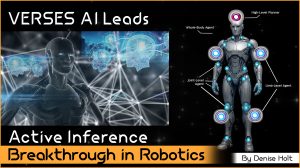
VERSES AI Leads Active Inference Breakthrough in Robotics
Blueprint for new robotics control stack that achieves an inner-reasoning architecture of mult-agents within a single robot body to adapt and learn on the fly.

Learn About Active Inference AI & the Spatial Web Protocol: Gain Your Competitive Edge & Get Certified!
The convergence of two groundbreaking technologies is reshaping how we think about AI, automation, and intelligent systems, affecting every industry across the globe. Here’s what you need to know now:The convergence of

IEEE 2874–2025 Spatial Web Protocol Ratified - Ushering ina New Era of Interoperable, Agentic Computing
On 29 May 2025, the IEEE Standards Board cast the final vote that transformed P2874 into the official IEEE 2874–2025 Spatial Web Standard – the 3rd foundational internet protocol since the beginning
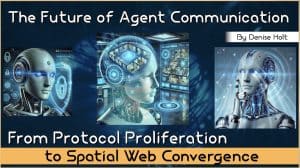
The Future of Agent Communication: From Protocol Proliferation to Spatial Web Convergence
Explore the future of agent communication protocols like MCP, ACP, A2A, and ANP in the age of the Spatial Web and Active Inference AI. Learn how these protocols serve today’s needs—and why

Exclusive Inside Look: One-on-One with Cortical Labs’ Chief Scientist - From DishBrain to CL1
Fusing neurons with silicon chips might sound like science fiction, but for Cortical Labs, it represents what’s possible in AI and computing.
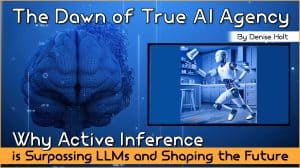
The Dawn of True AI Agency: Why Active Inference is Surpassing LLMs and Shaping the Future
We stand at a critical juncture in AI that few truly understand. LLMs can automate tasks but lack true agency. AI “agency” represents a fundamental departure from the pattern-matching paradigm of LLMs.
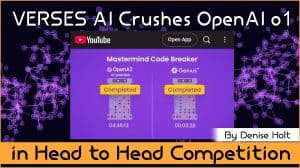
VERSES AI Crushes OpenAI o1 in Head to Head Competition
VERSES AI ‘s New Genius™ Platform Delivers Far More Performance than Open AI’s Most Advanced Model at a Fraction of the Cost.
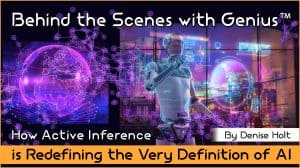
Behind the Scenes with Genius: How Active Inference is Redefining the Very Definition of AI
Go behind the scenes of Genius —with probabilistic models, explainable and self-organizing AI, able to reason, plan and adapt under uncertainty.
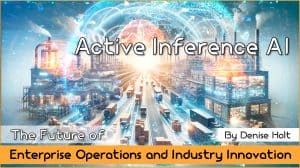
Active Inference AI: The Future of Enterprise Operations and Industry Innovation
By understanding and adopting Active Inference AI, enterprises can overcome the limitations of deep learning models, unlocking smarter, more responsive, and ethically aligned operations.
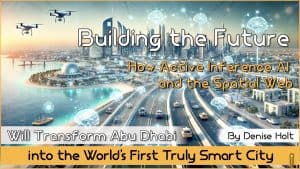
Building the Future: How Active Inference AI and the Spatial Web Will Transform Abu Dhabi into the World’s First Truly Smart City
The initiative between VERSES AI and Analog in Abu Dhabi isn’t just about technology - it’s about reinventing urban life. By incorporating Active Inference AI, Spatial Web technologies, and RGMs, Abu Dhabi

VERSES’ Latest Research Advances Beyond GenAI with RGM Conceptual Modeling For Better, Faster, and Cheaper AI
VERSES AI’s latest research introduces RGM (Renormalizing Generative Model) – A single all new AI model that uses Active Inference and is capable of doing everything individual GenAI models can do, PLUS

The IEEE Approval of the Spatial Web Global Public Standards: A Technological Awakening for AI
The IEEE has approved global public standards for the Spatial Web, signaling a significant advancement in AI technology. Denise Holt highlights that VERSES AI is spearheading this transformation, prioritizing First Principles AI,
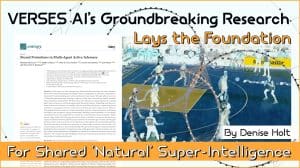
VERSES AI’s Groundbreaking Research Lays the Foundation for Shared ‘Natural’ Super-Intelligence
VERSES AI has unveiled a groundbreaking framework that “sets the stage” for ASI, and could have profound implications for the future of AI and human-machine cooperation.
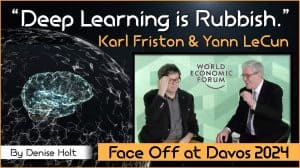
“Deep Learning is Rubbish” Karl Friston & Yann LeCun Face Off at Davos 2024 World Economic Forum
In a panel hosted by the Financial Times at the World Economic Forum in Davos, Switzerland, two of the biggest names in artificial intelligence — Dr. Karl Friston of VERSES AI, and

Hello 2024 — The Year Computing Changes Forever
Computing is changing on every basic and fundamental level. Generative AI is one piece of that computing puzzle. It’s a massive tool in this next era, but it’s not the framework for

Turning Point in AI - Leaders Rally for a Natural AI Initiative
A pivotal roundtable discussion held by the Boston Global Forum, the Active Inference Institute, and the Neuropsychiatry and Society Program on December 12, 2023, marked a significant turning point in our understanding

VERSES AI Announces AGI Breakthrough: Invokes Open AI’s ‘Assist’ Clause
In an unprecedented move by VERSES AI, today’s announcement of a breakthrough revealing a new path to AGI based on ‘natural’ rather than ‘artificial’ intelligence, VERSES took out a full page ad
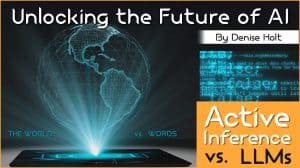
Unlocking the Future of AI: Active Inference vs. LLMs
Denise Holt’s article explores the current landscape of AI, questioning whether society is approaching genuine intelligence or simply enhancing advanced text generators like LLMs. It emphasizes the need to look beyond the
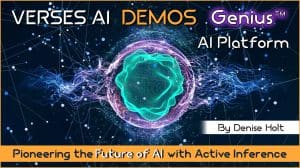
VERSES AI Demos Genius™ AI Platform: Pioneering the Future of AI with Active Inference
VERSES AI’s “Genius™” platform marks a pivotal moment in AI evolution, akin to historic technological milestones like the first rocket launch. CEO Gabriel Rene emphasizes the significance of this live demonstration, highlighting
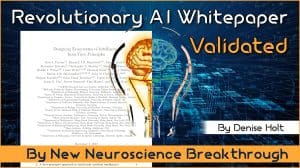
Revolutionary AI Whitepaper Validated by New Neuroscience Breakthrough
VERSES AI proposed a transformative AI paradigm in their 2022 whitepaper, “Designing Ecosystems of Intelligence from First Principles.” By leveraging a distributed, collective real-time knowledge graph and Intelligent Agents, they challenge traditional
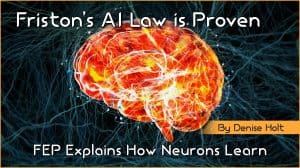
Friston’s AI Law is Proven: FEP Explains How Neurons Learn
Dr. Karl J. Friston, a leading neuroscientist and Chief Scientist at VERSES AI, is renowned for his contributions to brain imaging and the Free Energy Principle (FEP). Recent research in Japan has
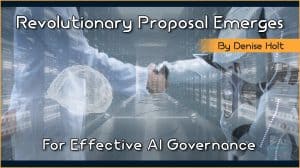
Revolutionary Proposal Emerges for Effective AI Governance
HSML, a programming language for the Spatial Web, facilitates effective AI governance by creating computable context. This advancement enhances AI’s perception, awareness, and understanding, aiming to transform the internet into a distributed
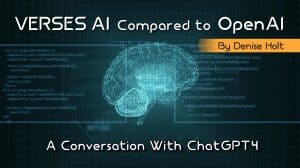
VERSES AI Compared to Open AI A Conversation With ChatGPT4
The article discusses a dialogue with ChatGPT4, highlighting key differences between Machine Learning LLMs and Active Inference AI. It emphasizes the benefits of Active Inference AI and examines how the Spatial Web
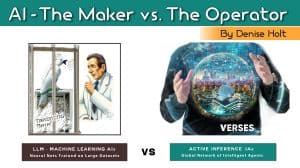
AI – The Maker vs. The Operator – Comparing LLM vs. Active Inference AI
The article discusses VERSES AI, which transcends traditional machine learning by utilizing Active Inference AI. This innovative approach is based on a real-time world model, enabling the AI to enhance its knowledge,
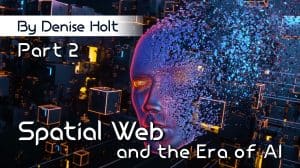
The Spatial Web and the Era of AI - Part 2 – Who is Karl Friston?
DENISE HOLT discusses the Spatial Web and Active Inference AI in her blog. She highlights the work of Chief Scientist Karl Friston and VERSES AI, who have created a detailed roadmap towards
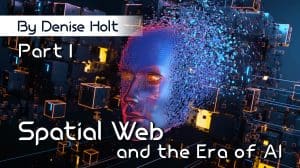
The Spatial Web and the Era of AI - Part 1 – What is Active Inference AI?
Active Inference AI represents a form of Autonomous Intelligence that enhances cognitive capabilities by thinking independently. It addresses the limitations of traditional AI approaches, such as deep learning and machine learning, marking
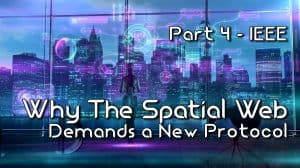
Why the Spatial Web Demands a New Protocol – Part 4 – Developing Global Standards with the IEEE
The article discusses the development of new internet standards, HSTP and HSML, alongside AI governance. These standards are being created through collaboration between the IEEE and the Spatial Web Foundation, highlighting the
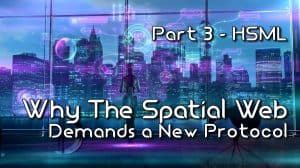
Why the Spatial Web Demands a New Protocol – Part 3 – What is HSML?
Resources – The Spatial Web AI Blog Why the Spatial Web Demands a New Protocol – Part 3 What is HSML? (Hyperspace Modeling Language) Author: Denise Holt November 30, 2022 Read Full
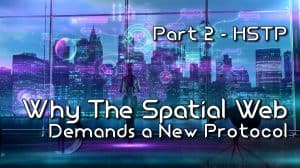
Why the Spatial Web Demands a New Protocol: Part 2 – What is HSTP?
The article discusses the evolution of internet protocols from HTTP to HSTP (Hyperspace Transaction Protocol), emphasizing the need for a new protocol to support the Spatial Web. This shift will facilitate the
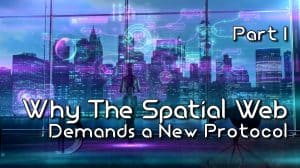
Why the Spatial Web Demands a New Protocol – Part 1 – How Does the Internet Evolve?
The Spatial Web, or Web 3.0, necessitates a fundamental shift in how we perceive and manage data connections among objects, situations, and individuals. This evolution in internet architecture calls for the development
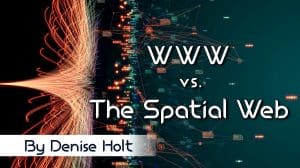
WWW vs. The Spatial Web – What is the Difference Between the World Wide Web and the Spatial Web?
The article by Denise Holt discusses the distinction between the World Wide Web and the Spatial Web, highlighting the importance of the Spatial Web Protocol and its associated languages, HSTP and HSML.
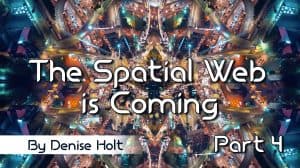
The Spatial Web is Coming: Part 4 – The Network of Everything
The Spatial Web heralds the emergence of a unified network integrating real and virtual entities, creating an “Economy of Everything.” Websites will transform into interconnected web worlds, enabling searchability and accessibility through
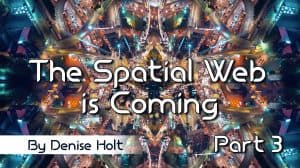
The Spatial Web is Coming – Part 3 – How Smart Technologies Function Within the Spatial Web
Resources – The Spatial Web AI Blog The Spatial Web is Coming – Part 3 – How Smart Technologies Function Within the Spatial Web Author: Denise Holt October 12, 2022 Read Full
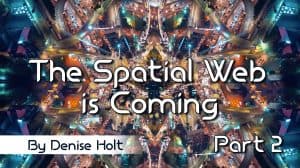
The Spatial Web is Coming: Part 2 – What are Smart Technologies?
Resources – The Spatial Web AI Blog The Spatial Web is Coming: Part 2 – What are Smart Technologies? Author: Denise Holt October 11, 2022 Read Full Article Summary What we really
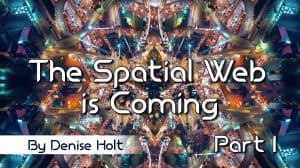
The Spatial Web is Coming: Part 1 – Is Big Tech Ready for Web 3.0?
The article “The Spatial Web is Coming: Part 1” by Denise Holt discusses the challenges facing emerging technologies and questions whether Big Tech is adequately prepared for the transition to Web 3.0.
VERSES AI Research Blog
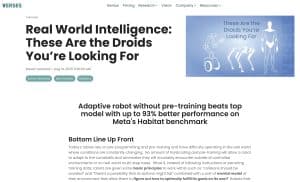
Real World Intelligence: These Are the Droids You’re Looking For
Adaptive robot without pre-training beats top model with up to 93% better performance on Meta’s Habitat benchmark
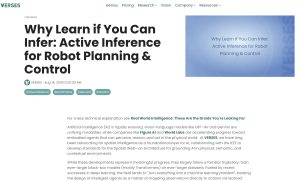
Why Learn if You Can Infer: Active Inference for Robot Planning & Control
What if, instead of learning policies directly, we equipped agents to infer the hidden causes of their observations—and to generate actions by reasoning about those inferred states? This is the central idea behind active inference: rather than passively learning behavior
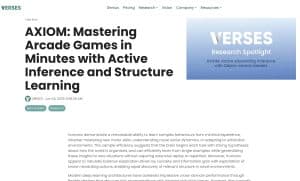
AXIOM: Mastering Arcade Games in Minutes with Active Inference and Structure Learningv
AXIOM plans with active inference. It rolls out imagined futures under its current world model, scores them by (i) expected reward and (ii) the information they would add to the rMM, then chooses the action sequence with the lowest expected
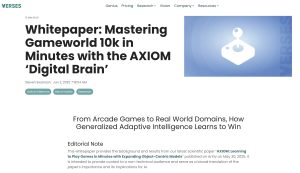
Whitepaper: Mastering Gameworld 10k in Minutes with the AXIOM ‘Digital Brain’
A New Benchmark Test For Generalized Intelligence
In our new research paper, we examine how AXIOM outperforms Google DeepMind’s top AI models in the Gameworld 10k benchmark (10 physics-consistent games, 10,000-step cap); results were validated by an independent third-party

Beyond Imitation Games: A Falsifiable Emergent Sentience Framework
VERSES Research Blog – by Ines Hipolito – “As artificial intelligence weaves itself ever more tightly into the fabric of society an age-old question looms larger: Can machines be conscious? This inquiry has been a North star guiding VERSES research

Benchmarking Predictive Coding Networks Made Simple
VERSES AI Research Blog – “Artificial intelligence (AI), as exemplified by large models such as ChatGPT, is one of the key technologies of this century. While most AI breakthroughs rely on deep neural networks trained via backpropagation on GPUs, this

Variational Bayes Gaussian Splatting: A Bayesian Approach for Continual 3D Learning
VERSES AI Research Blog – “In recent years, computer vision has made remarkable progress in understanding 3D scenes, fueled by innovations like Neural Radiance Fields (NeRF) and Gaussian Splatting. These methods are the backbone of applications, ranging from virtual reality

Gradient-free variational learning with conditional mixture networks
VERSES AI Research Blog – “Deep Learning (DL), enables many incredible capabilities such as image recognition, natural language processing, and content generation and results are fast and accurate. However, it uses a technique called Maximum Likelihood Estimation (MLE) and so

Achieving Human-Level Atari Gameplay with Object-Centric Priors and Active Inference
VERSES AI Research Blog – “It has been several years since deep reinforcement learning (DRL) algorithms first demonstrated superhuman performance in complex environments. One of the most seminal achievements was mastering Atari games using DRL architectures that learned directly from
Additional Articles

‘World Models,’ an Old Idea in AI, Mount a Comeback
The latest ambition of artificial intelligence research — particularly within the labs seeking “artificial general intelligence,” or AGI — is something called a world model: a representation of the environment that an AI carries around inside itself like a computational
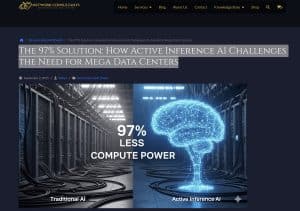
The 97% Solution: How Active Inference AI Challenges the Need for Mega Data Centers
Resources The 97% Solution: How Active Inference AI Challenges the Need for Mega Data Centers Author: Robyn Swick September 2, 2025 Read Full Article Summary The artificial intelligence boom has an insatiable appetite. With every new generative model, we hear
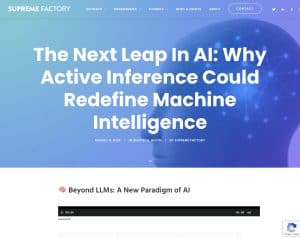
The Next Leap in AI: Why Active Inference Could Redefine Machine Intelligence
We’re entering a new era of Artificial Intelligence. While today’s large language models (LLMs) dominate the headlines, they may only represent the first chapter in the story of truly intelligent systems.
The world has been mesmerized by the rise of
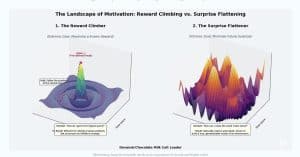
How a Tiny AI Startup is beating OpenAI by Redefining Intelligence [Breakdowns]
Today, we’ll be covering one such group called VERSES AI, a team w/ strong roots in physics and neuroscience. They are advancing a radical thesis, born from first principles of physics and biology: that intelligence is not the passive

Here Comes the World Wide Web of Everything
Resources Here Comes the World Wide Web of Everything The Spatial Web standard connects devices, robots, and AI agents Author: Gabriel Rene & Capm Petersen July 24, 2025 Read Full Article Summary Today, following the social media revolution, a new phase
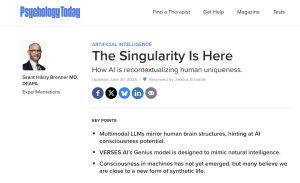
Psychology Today: The Singularity Is Here
Key points
Multimodal LLMs mirror human brain structures, hinting at AI consciousness potential.
VERSES AI’s Genius model is designed to mimic natural intelligence.
Consciousness in machines has not yet emerged, but many believe we are close to

AXIOM: Mastering Arcade Games in Minutes with Active Inference and Structure Learningv
AXIOM plans with active inference. It rolls out imagined futures under its current world model, scores them by (i) expected reward and (ii) the information they would add to the rMM, then chooses the action sequence with the lowest expected
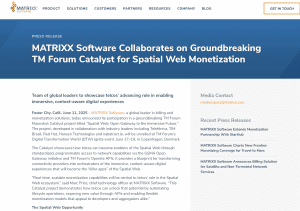
MATRIXX Software Collaborates on Groundbreaking TM Forum Catalyst for Spatial Web Monetization
MATRIXX Software, a global leader in billing and monetization solutions, today announced its participation in a groundbreaking TM Forum Moonshot Catalyst project titled “Spatial Web: Open Gateway to the Immersive Future.” The project, developed in collaboration with industry leaders including

WIRED – A Deep Learning Alternative Can Help AI Agents Gameplay the Real World
A new machine learning approach that draws inspiration from the way the human brain seems to model and learn about the world has proven capable of mastering a number of simple video games with impressive efficiency.
The new system, called
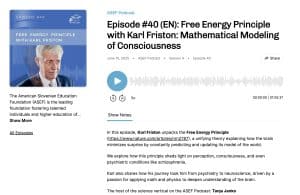
ASEF: Episode #40 (EN): Free Energy Principle with Karl Friston: Mathematical Modeling of Consciousness
In this episode, Karl Friston unpacks the Free Energy Principle (https://www.nature.com/articles/nrn2787), a unifying theory explaining how the brain minimizes surprise by constantly predicting and updating its model of the world.
We explore how this principle sheds light on perception,

VERSES Renews Agreement with Chief Scientist Karl Friston to Continue Innovation Multi-year Contract Builds on Success in Genius™ and Atari Benchmarks for Next-Gen AI
VANCOUVER, British Columbia, Dec. 23, 2024 (GLOBE NEWSWIRE) — VERSES AI Inc. (CBOE:VERS) (OTCQB:VRSSF) (“VERSES” or the “Company”), a cognitive computing company specializing in next-generation intelligent systems, announces that the Company has extended its exclusive contract with Professor Karl Friston,

CCE 2024 – Active Inference AI shakes up the enterprise AI conversation, with edgier thinking on what’s next
Diginomica – Jon Reed – “At CCE 2024, I expected a high level of AI fatigue – along with a focus on practical results. What I didn’t expect was a shakeup of the entire AI conversation, via Active Inference AI.

What the IEEE spatial web standard means for embodied AI – teaching AI to see the world
Diginomica – George Lawton – “Verses Founder and President Dan Mapes weighed in on the significance of the new IEEE P2874 draft standard for Spatial Web Protocol, Architecture and Governance. It promises to unify different world representations across the industrial

Multi-Agent Collective Intelligence with Active Inference (Part 1) Considering a two-level structure to derive collective intelligence
In this project the client offers an Enterprise Resource Planning (ERP) system that consists of a number of modules. The system runs as a SaaS (Software-as-a-Service). The client’s need is to consider the feasibility of adding a ‘Collective Intelligence’ module

How the Edge Computing Landscape is About to Change—and What it Means for EUC
The end-user computing (EUC) landscape is no stranger to transformation. From the early days of on-premises data centers to the rise of cloud computing, virtualization, and now hybrid workspaces, EUC has continually evolved to meet the changing demands of businesses

No Generalization without Understanding and Explanation Why AI needs symbolic and logical reasoning.
“John McCarthy, one of the founders of (and the one who supposedly coined the term) artificial intelligence (AI), stated on several occasions that if we insist on building AI systems based on empirical methods (e.g., neural networks or evolutionary models),

Big AGI Breakthrough: Leveling the Playing Field
“This blogpost addresses three key questions:
How important are RGMs?
What sort of context do we have for assessing RGMs?
What is the potential timeframe for RGM influence?”

Why Machine Learning Is Not Made for Causal Estimation Predictive vs. causal inference: a critical distinction
Machine Learning is made essentially for predictive inference, which is inherently different from Causal Inference. Predictive models are incredibly powerful tools, allowing us to detect patterns and associations, but they fall short in explaining why events occur. This is where

Brain cells in a lab dish learn to play Pong — and offer a window onto intelligence
A dish of living brain cells has learned to play the 1970s arcade game Pong.
About 800,000 cells linked to a computer gradually learned to sense the position of the game’s electronic ball and control a virtual paddle, a team

